7 Best Language Learning Apps: Reviews, Pricing, Features
Many people spend hours scrolling on their phone, losing evenings and weekends to social media and letting their personal development goals slide.
But what if you could turn all that screen time into something productive?
If you’re learning a new language, the best language learning apps can pull you away from TikTok, transforming procrastination into progress with your language skills.
Whether you want to build basic vocabulary, practise listening comprehension, or improve your speaking skills, today’s language apps can offer more flexibility and personalisation than traditional academies with fixed class schedules.

For many language learners, the right mix of app-based learning, structured lessons, and even live lessons with language teachers can make the difference between giving up and reaching fluency.
In this guide, we'll review the best language learning tools available today and compare their basic features, pricing, and effectiveness for both beginners and advanced learners.
Key Takeaways
-
Most apps focus on language aspects suited to specific learning levels, such as basic vocabulary acquisition, intermediate conversation practice, or advanced grammar
-
Many apps offer free trials before committing to a subscription
-
Some apps allow you to contact professional language tutors for personalised classes tailored to your learning level, needs and goals
-
Different apps cater to different learning styles: try out a variety of options to find the best fit for you
When choosing between language apps, take the following points into consideration:
-
Your current level: Are you a beginner, an intermediate learner, or an advanced student? Some courses are designed to build basic vocabulary, while other apps work best for those who have previous knowledge of their target language.
-
Your learning style: Do you learn best through image, audio, or text-based exercises? Some people, especially visual learners, may prefer apps with video content that they can watch, while others may find that listening or writing exercises are more effective methods.
-
Cultural context: The best apps don’t just teach vocabulary — they also introduce cultural contexts, key phrases, and relevant news stories, helping you connect your learning to real life situations.
-
Budget: Many language apps offer a free trial before you decide to commit. Some charge per lesson, while others offer online course subscriptions that are charged on a monthly or yearly basis.
The 7 Best Apps for Learning a New Language
Not all language apps are equal. Some focus on vocabulary words, others on grammar rules, and a few combine language lessons with human interaction. Here are the best apps tested across multiple languages including Japanese, Korean, French, Spanish, and German.
1. FindTutors – Best for Private One-on-One Lessons
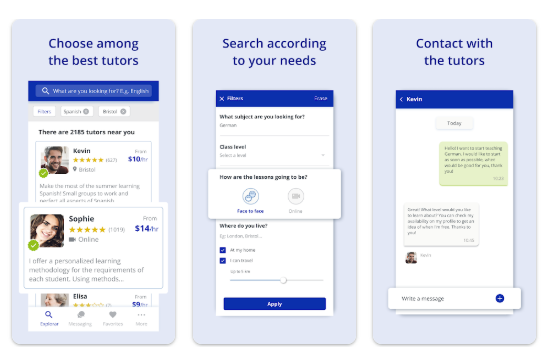
FindTutors connects learners with language teachers for personalised practice in over 40 languages. , the platform offers live one-on-one lessons with native speakers for conversational practice, listening skills, and grammar instruction.
Benefits of the FindTutors app include:
-
Browse unlimited tutor profiles and contact private teachers for free
-
Flexible pricing options suited to a range of budgets
-
Online and in-person courses adapted to your level, learning preferences and schedule
-
Tutors cater to young students and adult learners
-
Language classes for casual conversation, exam prep, and general academic support
-
Post your own student ad to find your perfect tutor match
Best for: Those looking for a flexible, accessible, student-first language learning solution
2. GoStudent – Comprehensive Language Courses for Exam Prep
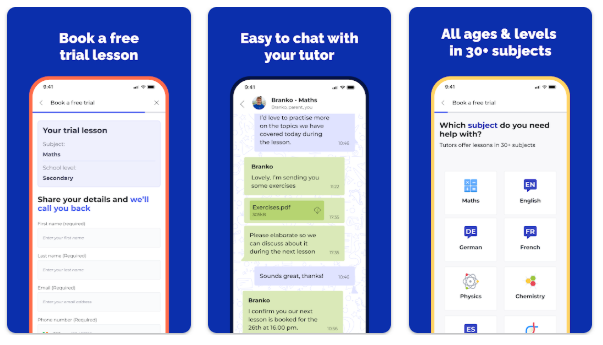
GoStudent provides structured lessons in popular language apps like Spanish, German, and French. Each 50-minute lesson is delivered by expert language teachers, making it useful for intermediate students and advanced learners seeking tailored courses aligned with the UK exam curriculum.
Benefits of the GoStudent app include:
-
Tutor-matching service based on your learning needs
-
AI-powered learning summaries for easy revision
-
Bespoke progress tracking for all courses
-
Free trial lesson and variety of membership packages available
Best for: Primary pupils seeking academic enrichment and students studying for GCSE and A-Level language exams
3. GoMigo – AI Language Learning
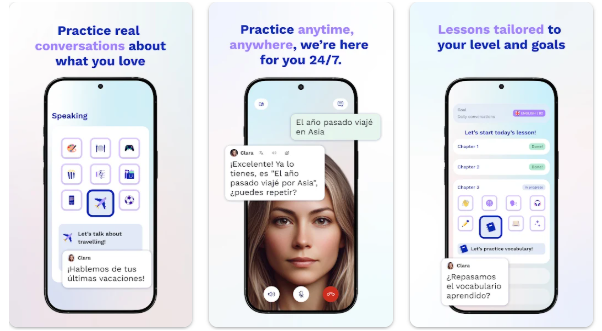
GoMigo uses AI tutors to explain grammar rules, teach vocabulary, and help you practise speaking. It features practice modes for specific situations, such as travel, shopping and job interviews.
Benefits of the GoMigo app include:
-
Five popular languages to choose from
-
Advanced speech-recognition technology for accurate feedback
-
Stats-based progress tracking
-
Adaptable courses suitable for all ages
Best for: Busy learners looking for language practice that fits their schedule
4. Duolingo – Best Free App for Beginners
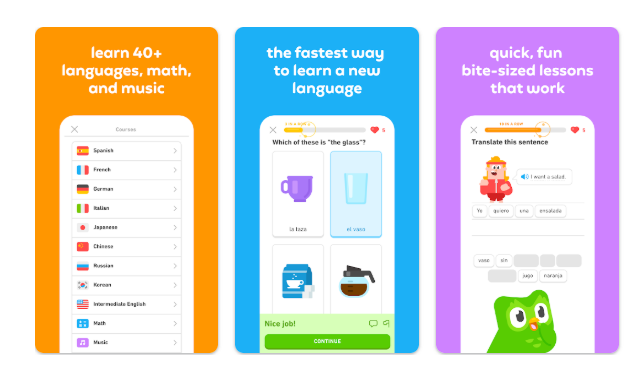
Duolingo is a popular Android app for language learners. It’s designed to promote vocabulary and grammar acquisition through gamified learning exercises. The free version works well for beginners, while the premium version unlocks spaced repetition features and ad-free learning.
Benefits of the Duolingo app include:
-
Accessible language exercises for new learners
-
Leaderboards and awards encourage consistent practice
-
Duolingo ABC for kids uses storytelling to teach vocabulary and grammar
Best for: Beginners looking for a fun way to practise their target language
5. Babbel – Detailed Lessons and Grammar Explanations
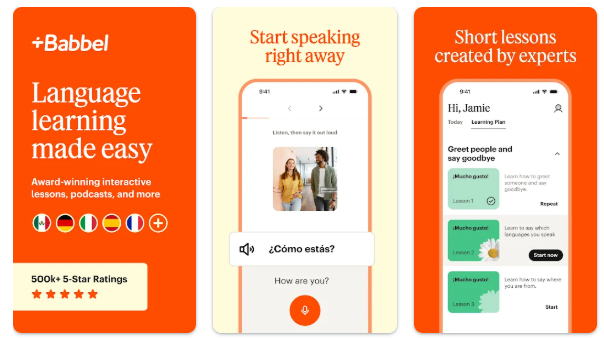
Babbel provides step-by-step grammar explanations, audio lessons, and practice exercises. Suited to intermediate and advanced learners, its structured lessons are aligned with the Common European Framework.
Benefits of the Babbel app include:
-
Spaced repetition to improve retention
-
Strong focus on improving speaking ability and pronunciation
-
Offline mode for WiFi-free practice sessions
Best for: Learners with prior language knowlege seeking to improve real-life conversation skills
6. Memrise – Vocabulary Building with Native Speakers
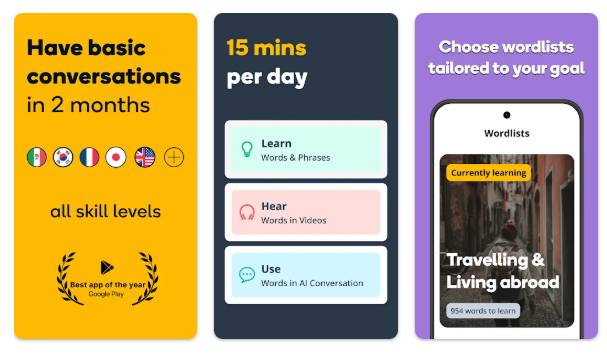
Memrise teaches new words and key phrases using videos of native speakers, making it effective for listening comprehension and speaking practice. The app allows learners to create flashcards for their chosen language, which may appeal to visual learners.
Benefits of the Memrise app include:
-
Customiseable word lists and revision resources
-
Bitesized lessons for busy learners
-
Skip-ahead option allows students to learn at their preferred pace
Best for: Students looking to improve their pronunciation and cultural understanding
7. Busuu – Community and AI Feedback
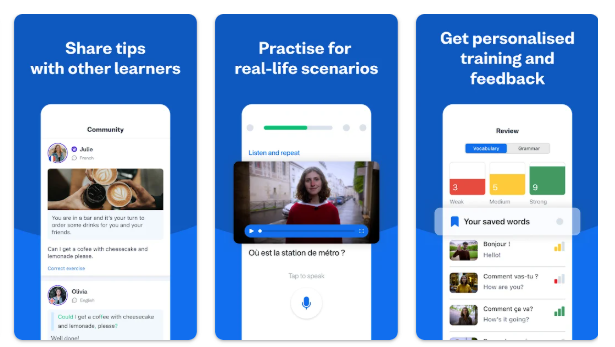
Busuu combines writing exercises with speech recognition technology and instant feedback. It also gives learners access to a community of other language learners and native speakers who can offer support and feedback on your progress.
Benefits of the Busuu app include:
-
Meet new friends who speak your target language
-
Focus on practical speech for everyday language skills
-
Digital certificates are available
Best for: Learners looking for group support as part of their language journey
Bonus App: Rosetta Stone
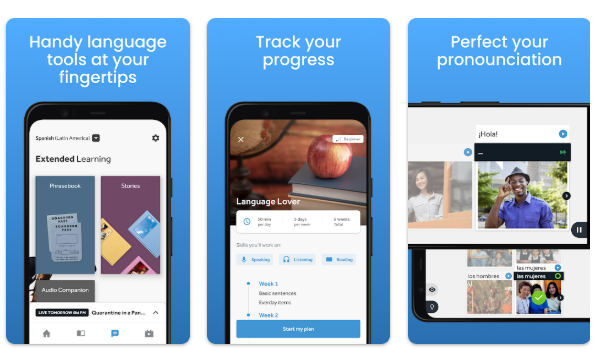
A well-known language learning app, Rosetta Stone combines immersion exercises in your native language and target language pairing. Its focuses on listening skills, vocabulary building, and cultural context.
Benefits of the Rosetta Stone app include:
-
Dual-language approach can make exercises more accessible
-
Supplemental short stories and phrasebooks help boost learning
-
Real-world speaking practice scenarios build contextual understanding
Best for: Students looking for an immersive learning experience
Language Apps Comparison - Free vs Paid
|
App |
Free Plan |
Paid Features |
Price Range |
|---|---|---|---|
|
FindTutors |
Free profile browsing and tutor contact |
Paid one-on-one online and in-person classes with professional tutors |
£12–40 per lesson |
|
GoStudent |
Free trial lesson |
Comprehensive curriculum, live tech-supported lessons, AI-powered class reviews |
From £21.99 per lesson |
|
GoMigo |
14-day free trial |
AI chatbot study support, voabulary quizzes, personalised learning path |
Monthly plan: £5 per month |
|
Duolingo |
Basic course features with ads |
No ads, spaced repetition, offline mode |
From £4.99 per month |
|
Babbel |
7-day free trial, first lesson free |
Detailed language courses, grammar explanations, audio lessons |
From £10 per month |
|
Busuu |
Community access with ads |
Speech recognition, offline lessons, structured lessons |
From approx. £9 per month |
|
Memrise |
Limited videos |
Full vocabulary building, listening practice, personalised flashcards |
From £30 per month |
Finding the right app - a personal choice

Choosing the best language learning apps depends on your learning style, goals, and budget. Gamified apps can be good learners who want basic vocabulary building exercises, while other students need live lessons to develop stronger speaking skills.
-
For real human interaction and personalised one-on-one lessons, FindTutors is one of the best language learning platforms available.
-
For structured lessons with grammar explanations, GoStudent is an excellent option.
-
If you’re looking for free basic language apps, start with Duolingo or Memrise.
Ultimately, the best language learning software is the one that keeps you motivated, helps you practise your target language every day, and see the best results!

